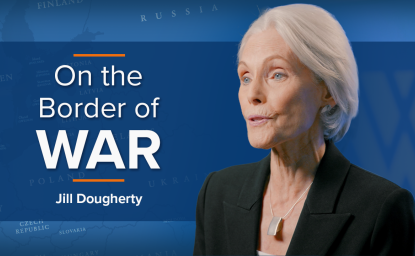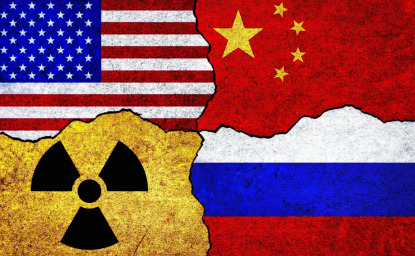The name George F. Kennan will forever be equated with the word "containment," the U.S. foreign policy strategy he authored for dealing with the Soviet Union throughout the Cold War. Through numerous writings and career roles—diplomat, historian, adviser, public intellectual, and political scientist among them—Kennan, who passed away in March 2005 at age 101, left a legacy of thought that helps us interpret history and remains relevant to foreign policy thinking today.
The Wilson Center's Kennan Institute, which he co-founded in 1974 and named for an ancestor, the elder George Kennan, who also was a Russia scholar, hosted a conference on February 8 to commemorate the many contributions of this influential diplomat and scholar.
The Policymaker
George F. Kennan authored the concept of containment, according to which the United States should "contain" Soviet expansionism but should not use, or threaten to use, force to remove the communist regime. Kennan first raised the idea in what became known as "The Long Telegram," sent on February 22, 1946. It recommended a U.S. policy based on the tenet that the Soviet system would not cooperate with the United States and, furthermore, had to act as an enemy to preserve its own power.
It was "a reflective analysis of the whole Soviet system," said Jack F. Matlock, who served in the U.S. Foreign Service for 35 years, including as ambassador to the Soviet Union from 1987-1991. "Rarely does one idea have such a major resonance
and lasting imprint on American foreign policy," said Angela Stent, director of the Center for Eurasian, Russian, and East European Studies at Georgetown University's School of Foreign Service. She said Kennan managed to explain Soviet behavior, predict its future policies, and prescribe policy for the United States during such a precarious time.
Containment was successful, in that Soviet expansion beyond Eastern Europe was halted. "But we now know it was precisely the Soviet overextension in the Third World, the imperial overstretch, culminating in the war in Afghanistan, that of course hastened the Soviet Union's demise," said Stent. Another reason for the Soviet demise, she said, which Kennan aptly predicted decades before its time, was the internal contradictions of its own economic system.
"He considered himself a realist, but I think he was an idealist as well," said Stent. Kennan admired the Russian people's endurance as well as their culture and history but, she said, "He was very critical of cynical, repressive manifestations of Soviet power." Kennan believed U.S. unilateral concessions would only enable Soviet power, she said, while economic aid would not elicit concessions, but instead allow the Soviets to strengthen their military base. Rather, Kennan advocated tough resolve and patience until potential dialogue with Russia might change the status quo peacefully.
One of Kennan's lesser known diplomatic achievements, said Matlock, was that he conceived of, and helped design, the Marshall Plan, which helped European nations rebuild after the devastation of World War II and served to increase European economic and political cooperation.
His ideas often diverged from his superiors, especially after Dean Acheson replaced George Marshall as secretary of state. Matlock said Kennan's ideas would come to be heavily criticized as Soviet military strength increased and its grip tightened on the countries it occupied.
"Kennan was almost always at odds with most foreign policy questions of both administrations, whether Democrats or Republicans," said Matlock. "But those of us in the government who knew the Soviet Union and dealt with its government recognize how profoundly correct much of Kennan's analysis was."
By the early 1950s, Kennan left the State Department and spent many years at the Institute for Advanced Study at Princeton, though he was recalled for stints as ambassador in Moscow and ambassador to Yugoslavia.
Much of Kennan's analysis was consistent with assumptions the U.S. government made in formulating Soviet policy, particularly those President Reagan came to espouse. Kennan believed military pressure alone could not bring about internal changes in the Soviet Union; instead he believed one must engage one's adversaries. In addition to favoring diplomacy, he also called for reducing armaments and eliminating nuclear weapons.
Matlock said, "Officials of the Reagan and first Bush administrations could honestly say that American policy had met the standard Kennan had set. Communism ended in the Soviet Union precisely as George Kennan had predicted almost 60 years earlier—as a result of internal contradictions, not because of pressure from the outside."
After the Soviet collapse, said Stent, Kennan supported robust engagement and opposed NATO enlargement on grounds that it might inflame nationalistic, anti-Western tendencies in Russia. Yet he continued to profess that the United States should not interfere in Russia's domestic affairs and should not preach, but influence countries through the force of example. He had written, "this whole tendency to see ourselves as the center of political enlightenment and as teachers to a great part of the rest of the world strikes me as unthought-through, vain-glorious, and undesirable."
The Scholar
"The depth that went into Kennan's ‘Long Telegram' came out of a lifetime of being a scholar as well," commented Kennan Institute Director Blair Ruble. Every speaker at this conference alluded to George F. Kennan's deep appreciation for Russia's people and traditions. He was well-versed in Russian history, language, and culture, which allowed him to offer deep insights into Soviet thinking and actions during his diplomatic career, and beyond.
Kennan authored more than 20 books, most of them relating to Russia. He won the Pulitzer and National Book Award both for his 1956 book, Russia Leaves the War, and for the first of two volumes of his memoirs. The second volume, Sketches from a Life, was published in 1989, the same year he received the Presidential Medal of Freedom.
To Kennan, understanding Russia's past was key to understanding its future, and he considered himself a historian, said David Engerman, an associate professor of history at Brandeis University. Although Kennan eloquently wrote books as a historian, said Engerman, praise and criticism for his scholarship was generally cast as commentary on Kennan, the diplomat. Kennan also left a lasting legacy through organizations in which he was involved, including the Kennan Institute, which Engerman called "a vote of confidence in Washington of commitment to a new generation of Russian studies."
"Kennan wrote history as it happened," said Allen Lynch, director of the Center for Russian and East European Studies at the University of Virginia. "His two-volume series on Soviet-U.S. relations survived a generation of revisionist assault and is still regarded as indispensable." After he was removed from official duties, "he had endless pause for reflection on man's fate," said Lynch. "He was in contemporary American civilization, but not of it."
While still in it, and of it, Kennan philosophized about the sources of international tension. "We must be gardeners and not mechanics in our approach to world affairs," he wrote, in his 1954 book, Realities of American Foreign Policy. "We must realize that we did not create the forces by which this process operates. We must learn to take these forces for what they are and to induce them to work with us
with understanding and sympathy, not trying to force growth by mechanical means, not tearing the plants up by the roots when they fail to behave as we wish them to
We do not need to insist
that change in the camp of our adversaries can come only by violence."
"As a writer, he is remembered for elegance of prose as well as the influence of his ideas, and his books have withstood the test of time," said John Lewis Gaddis, a professor and fellow at Yale University and Kennan's official biographer. Gaddis said Kennan had a special talent for connecting with audiences when he spoke, on such issues as nuclear dangers and environmental concerns. He also preached and practiced philanthropy. Yet, Kennan's diaries reveal the personal side of a self-critical man. "He held himself to standards he felt he never reached," said Gaddis.
As we continue to derive meaning and inspiration from Kennan's writings and ideals, we can reflect on this. Kennan once wrote, "Without a generation of civilized people to study history, to preserve its records, to absorb its lessons and relate them to its own problems, history, too, would lose its meaning."




